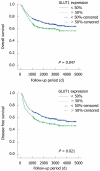Clinicopathologic significance of GLUT1 expression and its correlation with Apaf-1 in colorectal adenocarcinomas
- PMID: 21528061
- PMCID: PMC3080722
- DOI: 10.3748/wjg.v17.i14.1866
Clinicopathologic significance of GLUT1 expression and its correlation with Apaf-1 in colorectal adenocarcinomas
Abstract
Aim: To investigate the role of glucose transporter 1 (GLUT1) expression in colorectal carcinogenesis and evaluate the correlation with clinicopathological parameters and apoptosis-activating factor-1 (Apaf-1) expression in colorectal adenocarcinomas.
Methods: We used tissue microarrays consisting of 26 normal mucosa, 50 adenomas, 515 adenocarcinomas, and 127 metastatic lesions. Medical records were reviewed and clinicopathological analysis was performed.
Results: GLUT1 expression was absent in normal mucosa and low or moderately apparent in 19 cases (38.0%) of 50 adenomas. However, GLUT1 expression was detected in 423 (82.1%) of 515 adenocarcinomas and in 96 (75.6%) of 127 metastatic lesions. GLUT1 expression was significantly correlated with female gender (P = 0.009), non-mucinous tumor type (P = 0.045), poorer differentiation (P = 0.001), lymph node metastasis (P < 0.001), higher AJCC and Dukes stage (P < 0.001 and P < 0.001, respectively). There was a significant inverse correlation between GLUT1 expression and Apaf-1 expression (P = 0.001). In univariate survival analysis, patients with GLUT1 expression demonstrated poor overall survival and disease-free survival (P = 0.047 and P = 0.021, respectively, log-rank test).
Conclusion: GLUT1 expression was frequently increased in adenocarcinomas and metastatic lesions. GLUT1 expression was significantly correlated with poorer clinicopathologic phenotypes and survival of patients with colorectal adenocarcinomas.
Keywords: Adenocarcinoma; Apoptosis-activating factor-1; Colorectum; Glucose transporter 1; Prognosis; Survival.
Figures



Similar articles
-
Reduced expression of Apaf-1 in colorectal adenocarcinoma correlates with tumor progression and aggressive phenotype.Ann Surg Oncol. 2007 Dec;14(12):3453-9. doi: 10.1245/s10434-007-9541-2. Epub 2007 Sep 20. Ann Surg Oncol. 2007. PMID: 17882496
-
Clinical significance of human erythrocyte glucose transporter 1 expression at the deepest invasive site of advanced colorectal carcinoma.Oncology. 2001;60(2):162-9. doi: 10.1159/000055314. Oncology. 2001. PMID: 11244332
-
¹⁸F-fluoro-2-deoxyglucose uptake on PET CT and glucose transporter 1 expression in colorectal adenocarcinoma.World J Gastroenterol. 2012 Jan 14;18(2):168-74. doi: 10.3748/wjg.v18.i2.168. World J Gastroenterol. 2012. PMID: 22253523 Free PMC article.
-
The clinicopathologic impacts and prognostic significance of GLUT1 expression in patients with lung cancer: A meta-analysis.Gene. 2019 Mar 20;689:76-83. doi: 10.1016/j.gene.2018.12.006. Epub 2018 Dec 12. Gene. 2019. PMID: 30552981 Review.
-
Glut1 expression in T1 and T2 stage colorectal carcinomas: its relationship to clinicopathological features.Eur J Cancer. 2001 Jan;37(2):204-9. doi: 10.1016/s0959-8049(00)00371-3. Eur J Cancer. 2001. PMID: 11166147 Review.
Cited by
-
Prognostic impact of the combination of HIF‑1α and GLUT1 in patients with oesophageal squamous cell carcinoma.Oncol Lett. 2023 Jul 31;26(3):404. doi: 10.3892/ol.2023.13990. eCollection 2023 Sep. Oncol Lett. 2023. PMID: 37600334 Free PMC article.
-
Glucose transporter isoform 1 expression enhances metastasis of malignant melanoma cells.Oncotarget. 2015 Oct 20;6(32):32748-60. doi: 10.18632/oncotarget.4977. Oncotarget. 2015. PMID: 26293674 Free PMC article.
-
GLUT-1 may predict metastases and death in patients with locally advanced rectal cancer.Front Oncol. 2023 Mar 9;13:1094480. doi: 10.3389/fonc.2023.1094480. eCollection 2023. Front Oncol. 2023. PMID: 36968998 Free PMC article.
-
Loss of Wnt7a expression correlates with tumor progression and poor prognosis in colorectal carcinoma.Int J Clin Exp Pathol. 2018 Oct 1;11(10):4967-4976. eCollection 2018. Int J Clin Exp Pathol. 2018. PMID: 31949573 Free PMC article.
-
A Prognosis Marker SLC2A3 Correlates With EMT and Immune Signature in Colorectal Cancer.Front Oncol. 2021 Jun 15;11:638099. doi: 10.3389/fonc.2021.638099. eCollection 2021. Front Oncol. 2021. PMID: 34211835 Free PMC article.
References
-
- Jemal A, Murray T, Ward E, Samuels A, Tiwari RC, Ghafoor A, Feuer EJ, Thun MJ. Cancer statistics, 2005. CA Cancer J Clin. 2005;55:10–30. - PubMed
-
- Compton CC. Colorectal carcinoma: diagnostic, prognostic, and molecular features. Mod Pathol. 2003;16:376–388. - PubMed
-
- Walker J, Quirke P. Prognosis and response to therapy in colorectal cancer. Eur J Cancer. 2002;38:880–886. - PubMed
-
- Huerta S, Goulet EJ, Livingston EH. Colon cancer and apoptosis. Am J Surg. 2006;191:517–526. - PubMed
-
- Soumaoro LT, Uetake H, Higuchi T, Takagi Y, Enomoto M, Sugihara K. Cyclooxygenase-2 expression: a significant prognostic indicator for patients with colorectal cancer. Clin Cancer Res. 2004;10:8465–8471. - PubMed
Publication types
MeSH terms
Substances
LinkOut - more resources
Full Text Sources
Medical
Miscellaneous

